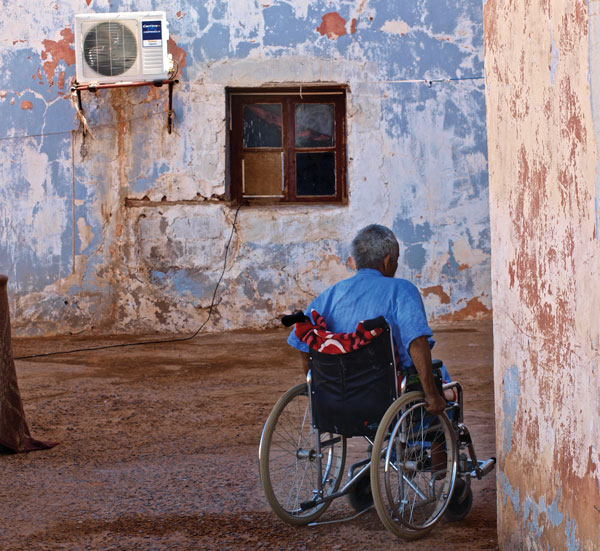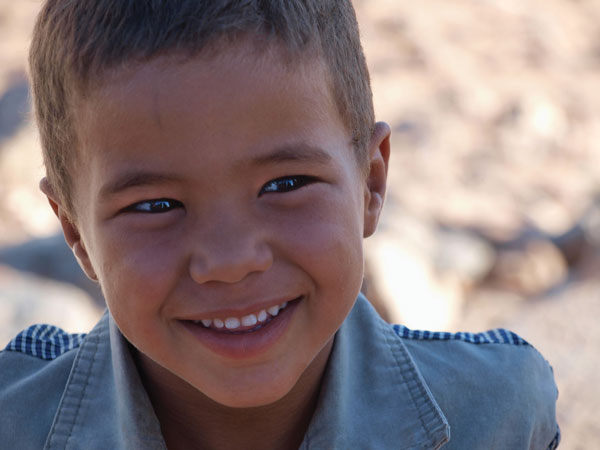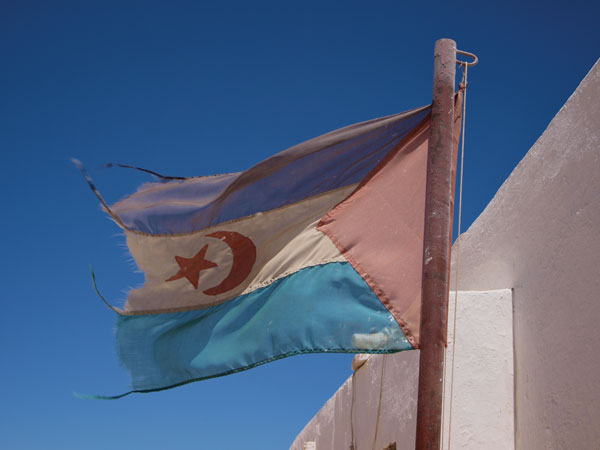The Sahrawi people are one of the longest-standing refugee populations in the world. The Sahrawi Arab Democratic Republic (RASD) was formed in 1976 by the Sahrawi people in exile. The political situation has been tense to say the least, with the positions of both Morocco and the Polisario Front, the national Sahrawi liberation movement, having been endorsed by the Arab League and African Union respectively. Loosely summarized, the Spanish and Algerians have long supported the Sahrawis, with France and the US shoring up the Moroccan side. Despite a clear ethical imperative to resolve the Sahrawi situation, gathering the political will to further their cause at the UN has been difficult.
The Sahrawi people have literally had to build a health care system for themselves out of the bare, dry, desert
The 165,000 Sahrawi refugees living in neighbouring Algeria are resolute about the temporary nature of the camps, despite a serious lack of water, shelter and medicinal resources, for which they currently depend almost entirely on foreign aid. Yet, RASD has a level of organisational structure that most refugee populations, such as those in Sudan, Chad or even in Palestine until the last few decades, have not attained. For the Sahrawis, the settlements are only models, prototypes to help them qualify for the ‘official right’ to self-rule in the eyes of the international community, and to assist in the transition and initial periods of that rule.

The combined World Food Program (WFP), Human Aid and Civil Protection department of the European Commission (ECHO) and United Nations High Commissioner for Refugees (UNHCR) multilateral aid to RASD was $30 million in 2007. To put this in perspective, as Western Sahara Resource Watch point out, Morocco would have earned in the region of $15 billion on phosphate resources taken from the territory they occupy in Western Sahara during a similar period. For the Sahrawis, it is a desperately unhealthy, poor and uncertain existence in the camps – they live with the fear that international assistance could dry up at any
time.
A Home in the Desert
The Sahrawi refugees are spread mostly between four main settlement districts or wilayas – ‘Laayoune’, ‘Awserd’, ‘Dakhla’ and ‘Smara’, located on the hammada (the flat, dune-less desert plain region of the Sahara). ‘Rabouni’, ‘27 February’ and ‘12 October’ are all fast growing satellite camps nearby. The camps comprise of thousands of flimsy clay, sand and brick dwellings strengthened with scrap metal and stones which offer inadequate shade from the intense 50°C heat. For the most part, the huts have traditional nomadic tents (which stay cooler during the day) erected close by. The wilayas otherwise comprise of slightly larger brick structures for schools and municipal meeting places in between rocky outcrops and water tanks on which small children play.
Chronic malnutrition was recently recorded to be 19% for the child population, exceeding the UN estimates of 15% child malnutrition constituting an ‘emergency crisis’
The soil is arid and infertile. Food and other basic amenities are available from the typically Arab-style marketplaces, mainly scrounged from the limited trade links with Mauritania to the south. Chronic malnutrition was recently recorded to be 19% for the child population, exceeding the UN estimates of 15% child malnutrition constituting an ‘emergency crisis’. Camp-wide estimates show roughly 33% malnutrition. World Health Organisation (WHO) reports of endemic childhood anaemia are worryingly persistent: 35% in 2002, 69% in 2005 and 61% in 2008.
The Beginnings of a Health System
Initially starting out with only five nurses and two medical students, Mr. Sidahmed, RASD Minister of Health, (himself initially one of those two medical students) now has a system comprising of regional hospitals each capable of handling several dozens of patients at a time in every wilaya, with local clinics in each daïra (sub-district) to penetrate as deep into the maze of huts as possible.
Mr. Sidahmed identifies prevention as the best strategy for their disadvantaged health system. Several Sahrawi doctors admit, however, that with many illnesses, they still have to contend with traditional healing practices, which empirically seem to be counterproductive. As an old lady practitioner in Smara, skilled in herbal medicines, softly proclaims: Allah is the ultimate decider of fates.
Medical supplies typically fill one ceiling-high cupboard and mini-fridge per hospital, and equipment is fairly out-dated. Lighting and power are frequently cut off, especially in Smara and Dakhla, with obvious repercussions for what limited, overburdened x-ray and laboratory capabilities presently exist. Beyond chronic diabetes-related conditions, skin lesions and acute malnutrition/anaemia, serious cases are referred up the chain of command to the camp hospitals, and beyond that to the national hospital at Rabouni, and finally to Tindouf in Algeria proper. Here the critically ill (mainly complicated pregnancy cases) are received – that is, if they have survived the road journey – by the Algerians.
Ibrahim, a nurse working in the accident and emergency room at the national hospital in Rabouni (which is quite literally just a medium-sized room with half a dozen beds), has to carefully ration such items as saline or glucose drips, bandages and needles, improvising his clinical procedures with whatever comes to hand. He has no time or means to pursue differential diagnoses like UK clinical codes of practice dictate, neither do the doctors, surgeons or GPs. Gut feeling guides many of the doctors’ snap decisions on patients, in what is either extremely good experience at dealing with repetitive case presentations, or necessary restriction of patient processing to just the most basic physical examination and history taking. It could be seen as dismissively quick or conversely, just efficient and utilitarian.
Only a handful of doctors specialising in obstetrics and gynaecology (always prioritised over the other medical specialties in any Sahrawi hospital), general surgery, ophthalmology, and paediatrics are spread around the six or so hospitals in the camps. There is little redundancy in the system and it can easily get overwhelmed or diverted, mostly at Rabouni, where ‘referral bottlenecks’ can form.

The problem, as the main urologist at Rabouni explains, is that Sahrawi doctors (himself included) are trained in Cuba and Spain, countries with whom the Sahrawis share a language and have past colonial ties. But he says there is little incentive to come back – as poorly as it may reflect on the young Sahrawis – because a camp doctor’s life is very tough. He is on call 24/7, with long periods of inactivity sporadically punctuated by intense work periods. For the past several years, he has had no private life and little time to spend with his family, and is often rushing between wilayas at 2 or 3am.
However, emigration may indeed prove useful for raising awareness of the Sahrawis’ plight through networking and deployment of aid missions. Several such missions have built air-conditioned laboratories in the national hospitals over the years and performed mass ophthalmological and general check-ups in the camps. This has in itself reduced the workload on doctors. It is difficult to know what the future holds for this new generation born unfortunately into refugee status, yet still with ambitions and dreams of their own.
Rationing Care
For some 20 years following the occupation, there was an armed struggle that left many thousands dead and many hundreds wounded. Mr. Hanshi is director of a landmine hospital near one of the settlements, founded by a St. John Ambulance mission to Algeria. There are around 60 patients, wheelchair-bound, paraplegic or quadriplegic in his charge. Aged patients are the majority and are housed in small, bare rooms. Some of them have their families for company; others have just the handful of staff employed to assist them.
Medical supplies typically fill one ceiling-high cupboard and mini-fridge per hospital, and equipment is fairly out-dated
At the main pharmacy in an outpost between the camps, the administrator has the task of allocating ECHO and UNHCR supplies for division and delivery to the various hospitals and clinics. The question arises of how much should one set aside for palliative care when assessed against the general medical needs of the population. A tough choice to make, assuming the supplies actually arrive on schedule, which, as the administrator freely admits, they often fail to do.

UNHCR workers located at Weather Haven compound in Rabouni say that estimating the total refugee numbers, let alone their health status, has been extremely difficult for a wide variety of logistical, cultural, political and bureaucratic reasons. They are wary of overstepping their authority with RASD authorities in what is certainly unfamiliar territory for them. How far WHO, Mundubat, UNHCR, ECHO and the WFP should implicate themselves in the running of the camps is a key question. Offending or intruding upon the Sahrawi stance of refusing to see these settlements as permanent arrangements (despite 36 years of frustrating exile), is something they want to avoid.
Political Solution or Continued Aid?
The background to all of this is of course the terrible food and water shortages affecting particularly Sahrawi children, for whom time and delayed action means a consignment to morbidity. In the short term, improving things in the camps must be the priority. Food and medicine delivery need to be regulated, normalised and preferably increased as the Sahrawi population expands and water resources dwindle. Activism fostering strong public awareness and discussion of these issues is paramount to ensure Western governments maintain this aid, yet continued aid is not the ultimate solution.
How far should WHO, Mundubat, UNHCR, ECHO and the WFP try to implicate themselves in the running of the camps is a key question
The role of Algerian and Spanish governments has been a mixed one. On the one hand they have given invaluable aid and some diplomatic assistance, but to what extent should they adopt a more proactive policy concerning the plight of the Sahrawis, and offer a convincing opposition to France and Morocco, the main antagonists of Sahrawi self-determination in the UN?
Political activism via social media such as that carried out by Resistencia Sahraui, and independent news organisations such as The Real News and Democracy Now are helping to increase pressure on Moroccan and French authorities to sit down with RASD leaders and appreciate their moral imperative to facilitate democratic steps forward.
The Sahrawis will continue to lobby, protest, and persist against the odds. Meanwhile, we have to decide whether to pass the buck or accept our ethical responsibility to lobby on their behalf.








